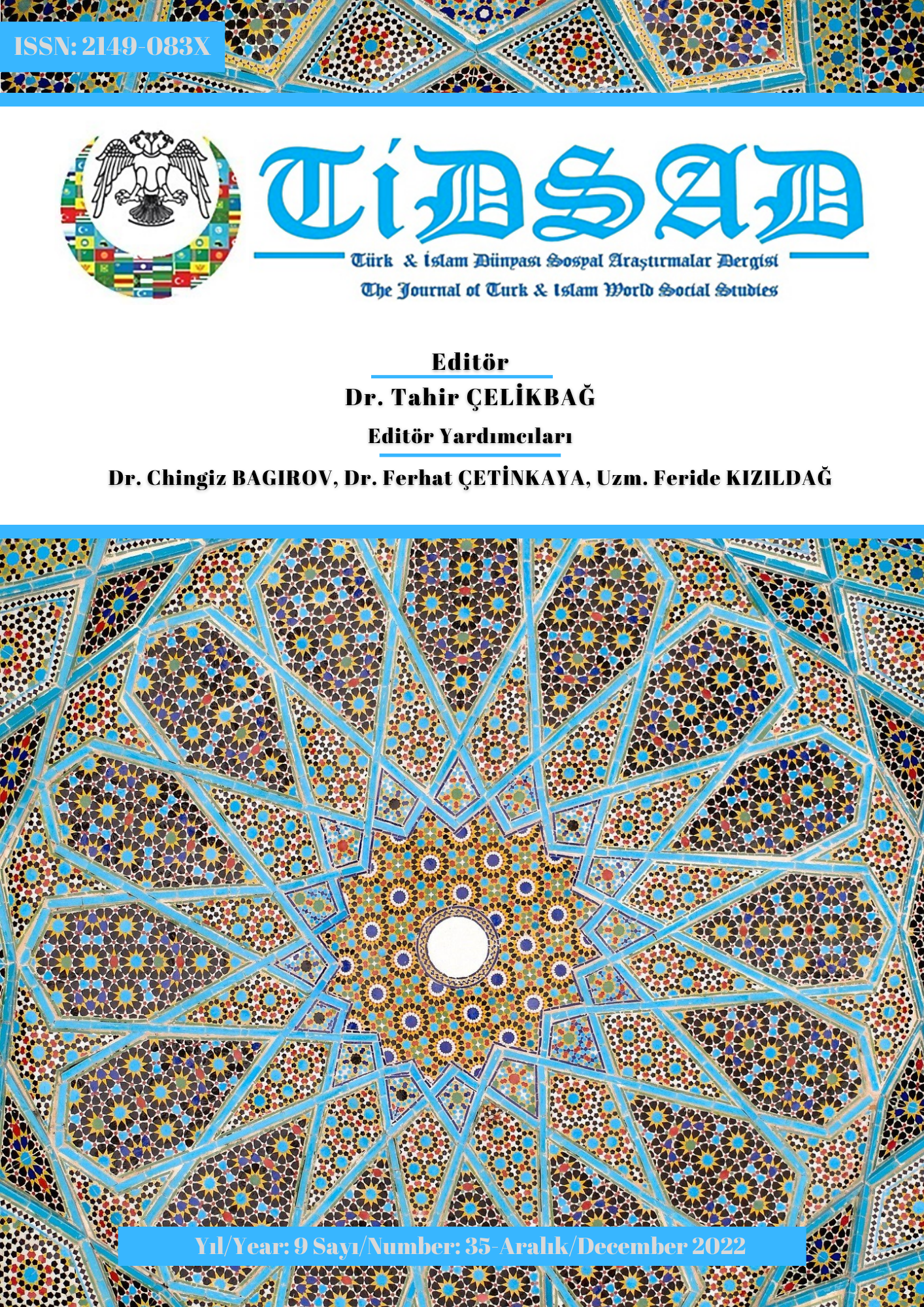Author :
Abstract
İnsanlığın mutluluğunu temin için indirilen vahiy, insana en doğru yolu göstermektedir. Toplum halinde yaşamak zorunda olan insanın nasıl yaşayacağını da en iyi olarak yine yaratan gösterebilir. Kur’ân bize idarelerin şeklini değil, ancak nasıl olması gerektiğini beyan ederek, yönetim ilke ve özeliklerini göstermektedir. Bu çerçevede müminlerin idare özelliklerinden birinin istişâre, meşveret, şûrâ (danışma) olduğu görülmektedir. Asr-ı saadetteki uygulamalar da şûrâ'nın sosyal yaşamdaki önemini ortaya koymaktadır. Şûrâ'nın yöneten ve yönetilen arasındaki köprü görevini ifa etmesi yanında, insanları alınan kararlara ortak etme, insanlara değer verme, diktatörlüğü engelleme gibi birçok özelliğinin olduğu görülmektedir. Konunun en güzel örneği, Uhud savaşı öncesi Hz. Peygamberin ashabı ile savaş konusundaki yapmış olduğu istişaredir. İstişaredeki çoğunluk görüşü ve ilkesellik açısından çoğunluğun görüşüne uyan Allah Resûlu'nun kendi görüşü farklı olması rağmen dayatma yapmaması, çoğunluğun görüşüne göre hareket eden Allah Resûlüne karşı münafıkların olumsuz tavırları ile Uhud savaşı istişaresi son derece dikkat çekicidir. Biz bu makalede İslam tarihinde ve özellikle de Allah Resûlünün uygulamalarında istişarenin uygulanmış en güzel hali olan Uhud savaşını ele aldık. İstişare, despotizmin panzehri bir ilke olarak, yöneten ve yönetilen arasındaki köprü, insanların gönüllerini hoş tutarak huzur ve adalete vesile olmayı sağlamaktadır.
Keywords
Abstract
Divine Revelation was lowered for providing the happiness of humanity and shows to the mankind the way towards to the happiness. Because, only his Lord can show how to treat a person who has to live in a community, so the Qur’ân shows us the principles, not the form of the administrations. The practices in the era of bliss (asr-ı saadet) also reveal the importance of shura (consultation) in social life. In addition to fulfilling the role of bridge between the ruler and the ruled, It is seen that the shura (consultation) has many features such as making people share in the decisions taken, valuing people and preventing dictatorship. The best example of the subject is the consultation that the Messenger of Allah (peace be upon him) had with his companions before the battle of Uhud. The majority opinion in consultation and the fact that the Messenger of Allah (peace be upon him), who was subject to the opinion of the majority in terms of majority size and principle, did not impose his opinion on them even though his opinion was different. The negative attitudes of the hypocrites against the Allah’s Messenger (peace be upon him), who acted according to the opinion of the majority, and the consultation on the Battle of Uhud are extremely striking. In this article, we discussed the Battle of Uhud, which is the most beautiful form of consultation in the history of Islam and especially in the practices of the Messenger of Allah (peace be upon him). Consultation, as an antidote to despotism, is the bridge between the ruler and the ruled, and it provides peace and justice by keeping people's hearts happy.
Keywords
- Ahmed b, Hanbel Ebû Abdullâh Ahmed Muhammed b. eş-Şeybânî, (1421/2001). el-Müsned İmam Ahmed İbn Hanbel, thk: Şuayb el-Arnâvûtî, Âdil Mürşid, Amir Ğadbân, Beyrut: Müessetü’r-Risâle.
- Azimli, Mehmet.(2010), "Uhut Savaşı Etrafında Bazı Mülahazalar". Hikmet Yurdu, (Yıl:3, S. 5 s.11-18).
- el-Cevherî, İsmail ibn Hammâd, (1987). es-Sıhâh Tâcu’l-Lüga ve Sıhâhu’l-Arâhiyye, thk. Ab- du’l-Gafur Ahmed Beyrut: Daru’l-İlm li’l-Melayîn.
- el-Endelûsî, Ebû Hayyân (1983). Tuhfetu’l-Erîb bi mâ fi’l Kur’âni minel Ğarib, Beyrut: Mek- tebu’l-İslamiyye.
- el-Ezherî, Muhammed b. Ahmed, (2001). Tehzîbu’l-Luğa, Beyrut: İhyau’t-Turâsi’l-Arabî.
- Firûzabâdî, Mecduddîn Ebû Tâhir Muhammed b. Yakûb. (2005). el-Kâmûsu Muhît, İşraf: Muhammed Naîm el-İrksûsî,( 1: 548.)Lübnan: Müessetür-Risâle, 8. Baskı.
- Hamidullah, Muhammed- Avcı, Casim. (2012). "Uhud Gazvesi", Türkiye Diyanet Vakfı İslam Anksiklopedisi, (42/54-57), İstanbul: TDV Yayınları.
- İbn Fâris, Ebü’l-Hüseyn Ahmed b. Fâris b. Zekeriyyâ b. Muhammed er-Râzî el-Kazvînî el- Hemedânî.(1389/1969). Muʿcemü meḳāyîsi’l-luġa nşr. Abdüsselâm M. Hârûn, Kahire.
- İbn Fâris,Ebû’l-Hüseyn Ahmed,(1979). Mekâyisu’l-Luğa, Beyrut: Dar’ul-Fikr.
- İbn Hişâm, Ebû Muhammed Cemâleddîn Abdulmelik, (1375/1955). es-Siretu’n-Nebeviyye, thk. Mustafa Sakka, 2 Cilt. Kahire: el-Halebî, 2. Baskı.
- İbn İshâk, Muhammed.(2004). es-Siretu'n-Nebeviyye, thk: Ahmed Ferid el-Mezîdî. (2 Cilt). Beyrut: Dâru'l-hütübi'l-ilmiyye.
- İbn Mâce,Ebû Abdullâh Muhammed b.Yezîd er-Rabei el-Kazvînî. (1975). es-Sunenu İbn Mâce, thk. Muhammed Fûad Abdulbâkî, Kahire: Daru İhyâi’t-Turâsil Arabîyye.
- İbn Sa'd, Muhammed, (2001).et-Tabakâtü'l-Kübra. thk. Ali Muhammed Ömer. 11 Cilt. Kahi- re: Mektebetü'l-Hancî.
- İsfehânî, Ebü’l-Kāsım Hüseyn b. Muhammed b.el-Mufaddal er-Râgıb. (2009).el-Müfredât fi Ğarîbi’l-Kur’ân, thk.Safvân Adnân Dâvûdî, Dımeşk: Dâr’l-Kalem.
- Karcı,Şemsettin. (2016).Fert ve Toplum açısından Kur’ân’da Sünnetullâh, İstanbul: Çıra Yayınları, 2. Baskı.
- Raysuni, Ahmet, (2018), Şûra-Subjektifliğin ve Bencilliğin Tiranlığından Kurtulmak-, çev. Selim Sezer, İstanbul: Mahya Yayınları, 2. Baskı.
- Sallâbî, Ali Muhammed.(2010).İslam’da Şûrâ, çev. Harun Ünal ve Bahaddin Sağlam, İstan- bul: Ravza Yayınları.
- Sıcak, A. Sait (Kasım 2018), “İlkelilik Ahlakı Açısından Kur’ân’da Uhud Gazvesinin Anlatımı ve Şûrâ Prensibi”, Cemil Meriç-10. Sosyal Bilimler Ve Spor Kongresi: Hatay, (621629).
- Sönmez, Abidin(1984), Şûra ve Resûlullah'ın Müşaveresi, İstanbul: İnkilab Yayınları.
- Şankîtî, Muhammed b. Muhtar.(2009). Siyaset Fıkhı, İstanbul: Mana Yayınları.
- Tuğrul, Tezcan. (2010). “Şûrâ’nın Kaynağı Bağlamında İslam Öncesi Arap Yaşayışına ve Kur’ân’ın Şûrâ Âyetlerine Bakış”, Dinî Araştırmalar Dergisi (13/36 87-104).
- Türkmen, Hamza. (2021). Şûrâ ve Şûrâ Yönetimi, İstanbul: Ekin Yayınları, 1.Baskı.
- Yargıcı, Atilla.(2007). “Kur’ân’a Göre Şûrâ ve Demokrasi”, Dinî Araştırmalar Dergisi (9/27, 171-183).





